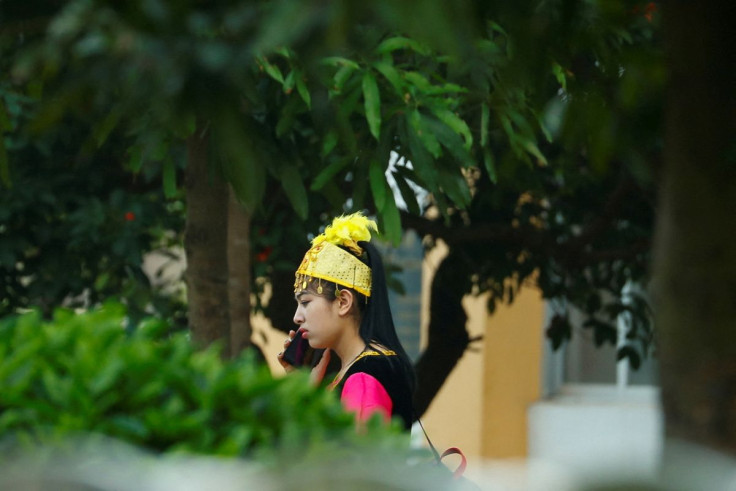Nike, Adidas Quizzed About Possible Links To Xinjiang Forced Labor; Asked How They Verify Suppliers
KEY POINTS
- The House Select Committee asked them whether forced labor in Xinjiang has permeated their supply chains
- The panel asked Adidas whether it was importing goods produced in Xinjiang
- Nike was asked if it verified that its manufacturing partner "no longer uses Uyghur forced labor"
The House Select Committee on China has reportedly sent letters to Adidas and Nike over the companies' potential links to forced labor of Uyghurs and other Muslim groups in the Xinjiang region. The panel has also sent letters to Chinese shopping platforms Shein and Temu.
The committee is seeking answers about whether the supply chains of Adidas and Nike have been affected by forced labor in China's western region of Xinjiang, Semafor reported. The panel cited expert testimony in their letters.
"What audit methods does Nike use to verify that suppliers in China – in and outside of Xinjiang – are not exploiting Uyghurs through state-sponsored labor transfers," the panel asked.
One expert told the committee that Adidas was "sourcing garments made not only from cotton from the Uyghur Region but also vicose, lyocel, polyester, leather and linen, reported Forbes. The letter, which was signed by panel chairman Mike Gallagher, R-Wis., and ranking member Raja Krishnamoorthi, D-Ill., asked Adidas whether it was in compliance with the U.S. Uyghur Forced Labor Prevention Act (UFLPA), which was signed into law in December 2021 by U.S. President Joe Biden and took effect last year. The UFLPA bans imports of products from Xinjiang.
Adidas was asked to respond by May 16.
The committee asked Nike whether the company has verified if the factory that manufactures millions of Nike products per year "no longer uses Uyghur forced labor."
This is not the first time questions were raised over Nike's supply chain.
In March, activist retail investor Tulipshare called on the Oregon-based apparel giant to provide more transparency about working conditions, specifically on forced labor tracking and possible wage theft risks.
Tulipshare, which owns 276 Nike shares, said it wants Nike to cooperate in identifying, assessing and avoiding "actual or potential human rights abuses that may significantly disrupt their business."
In 2020, the Australian Strategic Policy Institute accused Adidas and other top global brands of acquiring supplies from factories that used forced labor.
"Some factories across China are using forced Uighur labor under a state-sponsored labor transfer scheme that is tainting the global supply," the think tank said at the time.
The next year, sales of Adidas and Nike on Alibaba's Tmall website saw a slump as Chinese consumers called for a boycott of their products over the apparel giants' past statements related to alleged forced labor in Xinjiang, reported Insider.
Nike previously said it was "concerned about reports of forced labor" in the Chinese region, while Adidas said in 2019 that it had "no contractual relationship with any Xinjiang supplier."
Adidas also confirmed it was sourcing cotton from Xinjiang through a sustainability program called the Better Cotton Initiative and that the company found no cases of forced labor on cotton fields connected to the initiative.
After the UFLPA came into force last June, the American fashion industry was urged to avoid cotton coming from Xinjiang, raising concerns about how it would affect the supply chain as 84% of Chinese cotton comes from Xinjiang.
#ICYMI - Learn how CBP will implement the Uyghur Forced Labor Prevention Act #UFLPA ⬇️ pic.twitter.com/wgFSBD4PJO
— CBP (@CBP) June 27, 2022
A few months before that, researchers at the Agroisolab in Jülich and the Hochschule Niderrhein University of Applied Sciences said they found traces of Xinjiang-supplied cotton in T-shirts made by Adidas, Hugo Boss and Puma.
At the time, a spokesperson for Adidas told The Guardian that the company sources its cotton "exclusively" from other countries and it takes the necessary measures to ensure working conditions in its supply chain was "fair and safe."
The U.S. Department of Labor (DOL) has accused the Chinese government of detaining more than one million Uyghurs, a Muslim ethnic minority, in the autonomous region of Xinjiang. It also said an estimated 100,000 Uyghurs and members of other ethnic minorities may have been forced into poor working conditions after they were kept in re-education camps.
An assessment report from the United Nations Human Rights Office also raised human rights concerns in Xinjiang. The UN said there are "serious allegations" about human rights violations against the Uyghur people.
The Chinese government has since said it will not cooperate with the UN. The country has also denied any human rights abuses in Xinjiang.

© Copyright IBTimes 2025. All rights reserved.





















